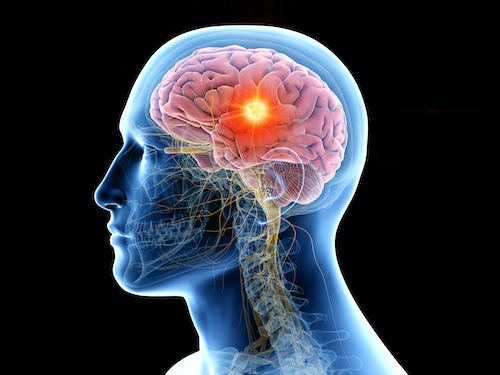
New Brunswick, N.J. May 6, 2021 – The cells in our bodies need to be able to heal to sustain life, whether that damage is from injury, sun radiation or chemicals that exist in our world. Sometimes that healing process goes wrong and small cancers can develop. Almost always, our immune system can find these early cancers and eliminate them, but rarely are they able to survive and grow larger, forming tumors or cancers. This can happen anywhere in the body, when they are in the brain or spinal cord they are called Central Nervous System (CNS) tumors.
The Central Brain Tumor Registry of the United States estimates that there about 25,000 new diagnoses of malignant CNS tumors in the United States each year and almost 60,000 diagnoses of non-malignant CNS tumors. But even non-malignant tumors can be problematic if they are located in a critical area of the brain or spinal cord. To better understand the disease, the Neuro-Oncology Program team at Rutgers Cancer Institute of New Jersey, shares some basic information on types of brain tumors, risk factors and treatment options.
What are common types of brain tumors and are they all cancerous?
We have heard many times the question – is my tumor considered cancer? There is a lot of anxiety wrapped up in that question and clearly the words that we use are important. Tumor refers to an abnormal growth, which can be either malignant or non-malignant. When we refer to malignant tumors, typically we expect they will grow quickly, spread within local tissues and can spread to distant areas (called metastasis), while non-malignant tumors don’t do any of those. However, in the brain/spinal cord, these distinctions are blurred as even slow growing, non-metastasizing tumors will invade local tissues, while the fastest moving malignant tumors like glioblastoma or malignant meningioma will only rarely metastasize. The most common type of tumors of the brain are gliomas, which can manifest as slow growing or fast growing like a glioblastoma and meningioma, most of which are grade I tumors, often very slow growing. Sometimes surgery is recommended and/or radiation and chemotherapy, while at other times we may just watch a tumor with repeated MRI scans and clinic assessments.
What signs and symptoms may indicate a brain tumor and what should prompt one to further discuss with a medical professional?
There are no specific symptoms that always mean an underlying brain or spine tumor is causing them. Commonly, patients who are diagnosed with a brain/spine tumor will complain of headache or have a seizure, but it turns out that if you look at every person who has a headache or even a seizure, very few of them will end up having a tumor and the vast majority will have some other explanation. If you are having symptoms, for example a headache which isn’t going away over time or even a seizure, you should seek medical attention to figure out why it is happening. Doctors can quickly evaluate these conditions and for the majority of people, provide reassurance that there isn’t a tumor explaining the symptoms.
How can we lower our risk for developing brain cancer?
There are no clear risk factors for developing most types of brain/spinal tumors other than some rare inherited/congenital cancer syndromes. More than 95 percent of patients we see have no clear risk factor or history for brain/spine tumor development.
How are treatment options different today from 10 years ago?
There are well over 100 different types of tumors which can arise from the brain/spinal structures and treatment can be very different for patients with different types/locations of tumors. For many we have made significant improvements in both treatments and outcomes, including newer surgical and radiation techniques which improve tumor control and reduce risk as well as novel chemotherapies which can be more effective than older medications. Ultimately, the goal is curing these tumors and unfortunately, we still have a lot of work to do to get there for many of our patients and their families. Despite this, there are many things we can do to help maintain hope and a good quality of life through the course of treatment. There are many options available, each with different expected benefits and side effects, and working with patients and their families to best balance treatment benefit with tolerability, in essence personalizing the treatment approach, is at the heart of neuro-oncology and the focus of what we do every day.
It is important to have a multidisciplinary cancer care team that specializes in treating brain and spine tumors, both cancerous and benign. As a National Cancer Institute-designated Comprehensive Cancer Center, Rutgers Cancer Institute in partnership with RWJBarnabas Health provides this level of care. Learn more about the Neuro Oncology Program at Rutgers Cancer Institute.
For patient appointments/inquiries – contact:
844-CANCERNJ (844-226-2376)

